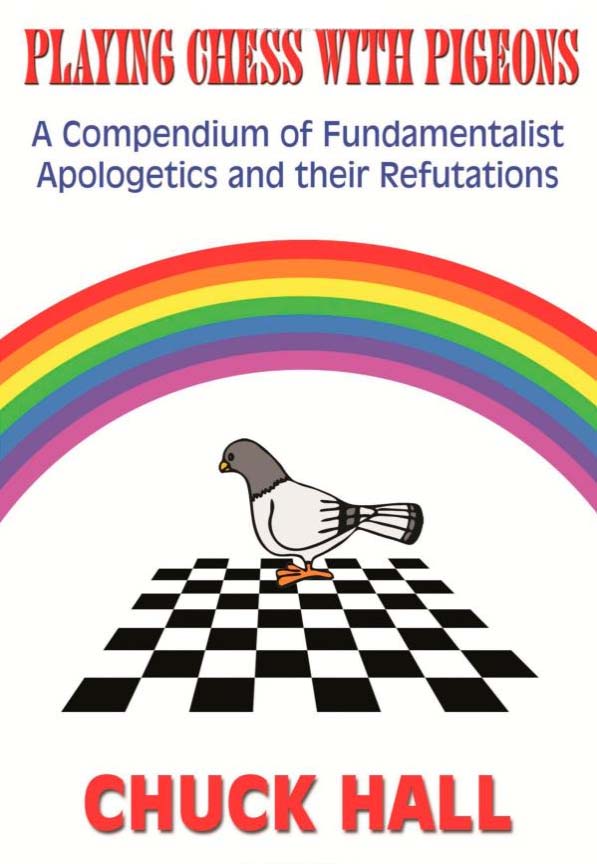By Lewis Campbell
Chuck Hall says he has been debating fundamentalist Christians for over forty years. Playing Chess with Pigeons certainly contains the largest arsenal of anti-fundamentalist debating points you are likely to find anywhere.
Hall provides a long list of typical fundamentalist arguments, along with a detailed refutation for each one. He also introduces some more unusual debating points. He gives us a very long list of contradictions in the Bible, and notes that even this long list is only the beginning. And in one especially interesting section, Hall cites numerous passages from scripture to show that the writers of the Bible almost certainly conceived of the Earth as flat.
.Playing Chess with Pigeons covers the Omnipotence Paradox briefly, and what a paradox it is. In Hall’s words:
“Could God create a rock too big for him to lift?” The purpose of this statement is to illustrate the absurdity of the argument of omnipotence. If God can create a rock too big for him to lift, then is his strength really omnipotent? On the other hand, if he can’t create such a rock, does this mean that his powers of creation aren’t omnipotent either?
In one impressive section, Hall surveys an extensive collection of research which demonstrates that fundamentalists are less intelligent than atheists on average. Of course this is an ad hominem argument which does not speak to the merit of fundamentalist beliefs themselves, but it does confirm many atheists’ suspicions.
Hall uses analogy very effectively. In discussing the resurrection, he writes:
For example, let’s say your Aunt Esther had died. You go to the funeral home and discover an empty casket. Do you automatically assume that Aunt Esther has risen from the dead, or do you look for a more logical, reasonable and simpler explanation? Maybe Aunt Esther’s body was misplaced. Maybe in your grief you got lost and you’re at the wrong funeral home. Maybe necrophiliacs stole the body. There are dozens of possible explanations that need to be exhausted before leaping to the illogical conclusion that Aunt Esther has risen from the dead and is now out dancing at the VFW club.
And in arguing that only an immoral god would create a hell, he writes:
Suppose I tell my daughter to clean her room, or I will punish her by taking her out in the back yard, dousing her with gasoline, and setting her on fire. Further suppose she disobeys me and doesn’t clean her room, so I take her out into the back yard and make good on my threat.
When the police arrive and ask what happened, I tell them, “Well, she knew what the consequences were if she disobeyed me. So it was her choice. She set herself on fire!”
Hall does not address some well-known but relatively subtle arguments for the existence of God, such as the Argument from Degree of Thomas Aquinas or the Ontological Argument of Saint Anselm. But perhaps these arguments are rarely used by fundamentalists.
Hall makes no attempt to keep his arguments civil. He writes in a freewheeling style, with liberal use of expletives, sarcasm, and insults. For example, Hall argues that praying to a toilet would be as effective as praying to God. This may be true, but it is not an argument likely to win the hearts of many theists. However, Hall says at the outset of the book that he is not trying to win any converts to atheism but merely providing support for those who already agree with him.
Playing Chess with Pigeons does not contain any obvious factual errors, but it does commit some sins of omission. For example, Hall argues that far from being an atheist, Hitler was a Catholic. What Hall fails to tell us is that while Hitler was a member of the Catholic Church throughout his life, Hitler was strongly opposed to the Church hierarchy and rejected large parts of the Bible. Because of Hitler’s many contradictory statements and actions regarding religion, historians disagree on Hitler’s actual beliefs.
Hall also cites Pygmalion in the Classroom by Robert Rosenthal and Lenore Jacobsen to support the idea that people often act according to the expectations others have for them, and that theists often see evil in others because that’s what they expect. What Hall doesn’t say is that numerous replications of the research reported on in Pygmalion in the Classroom have failed to duplicate its results, and the original research is now considered invalid by many experts.
Playing Chess with Pigeons provides an extensive array of rebuttals to a wide range of arguments in Christian apologetics, and it has some rollicking good fun doing so. Its arguments are unlikely to sway many theists, but if you favor a scorched-earth approach to debating fundamentalist Christians, this may be the perfect manual for you.


 Playing Chess with Pigeons: A Compendium of Fundamentalist Apologetics and their Refutations by Chuck Hall. BMDO Publications.
Playing Chess with Pigeons: A Compendium of Fundamentalist Apologetics and their Refutations by Chuck Hall. BMDO Publications.